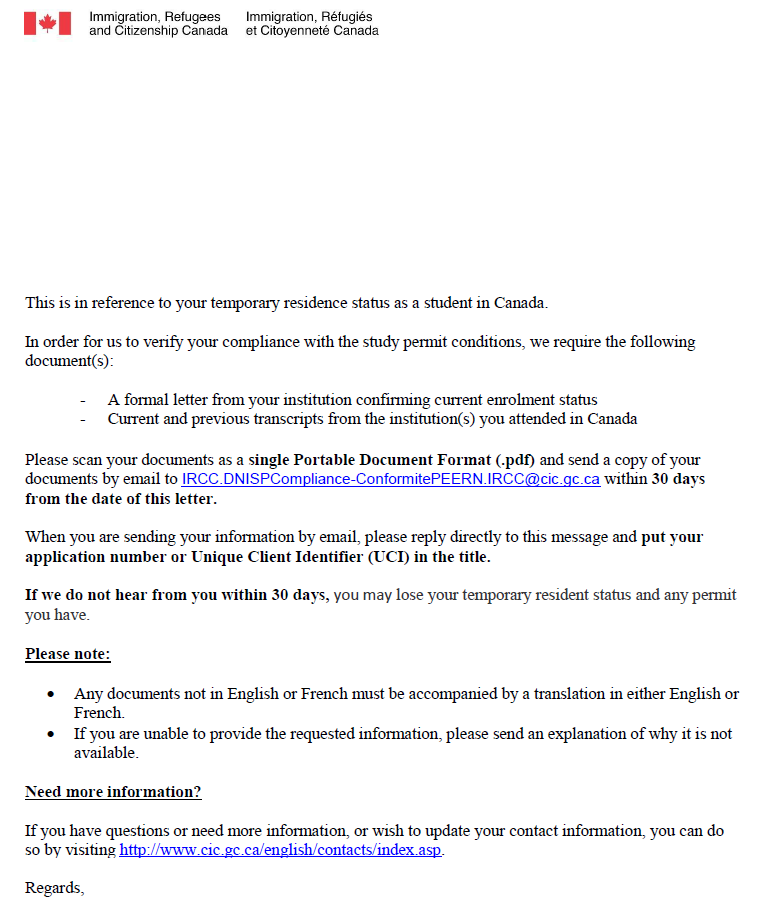As you may have seen from IRCC’s revamped study permit instructions website, the process of verifying whether a student is “actively pursuing studies” is finally being taken up by the Department. While some may find concern in this (given the broad nature of R. 220.1 IRPR), if it leads to less Port of Entry decisions and more assessment by those who understand the challenges of international students and can grant some of discretion, this can be a positive thing.
I have shared an earlier post – what the letter looks like but I want to provide some more details about what we know and what we don’t know. Hopefully, IRCC will also put up some sort of an information page that sets out the guidelines/thresholds to be met and what (if any) steps a student can take to explain peculiarities or normalize their study status when facing such a request. For one, it is not clear how a student is to address medical breaks, time outside Canada (when they are not subject to the requirement to actively pursue studies), or any other explanation in a manner that can lead to the exercising of positive discretion.
Step 1: Receive Email from IRCC
IRCC.DNISPCompliance-ConformitePEERN.IRCC@cic.gc.ca
- On this a side note and tip- many international students utilize the email of educational agents, family members, etc. to apply for study permits. For many of them, once you are comfortably in Canada and in school their obligation ceases to exist, but yours still do. I would suggest creating a MyCIC and linking your application to your new MyCIC to ensure that you get communication. Alternatively, you may choose to contact IRCC by IRCC webform to change your contact information. Still, IRCC has been known to send emails to wrong/old addresses. Being proactive will do you well here.
Step 2: Read the Email from IRCC carefully, noting deadlines, format and documents required
In this sample request, there are two things requested – one proving current enrollment status and a second requesting transcripts from past dates. There is also under the “Please note” section the ability to provide additional explanations.
With a deadline, you want to make sure that if (for whatever reason) documents may not be obtained within the deadline [let’s assume your consultant sent you this email three weeks late and a transcript takes one week to obtain from your former institution], make sure to email and ask for a reasonable extension of time.
Step 3: Review the Letter/Transcripts You Get Carefully
Not all letters and transcripts are self-evident when under review. It is possible the educational institution themselves may not have undergone an immigration audit of their letters, attendance records may be inaccurate/missing, or the transcript may have some issue that you were previously not a party to. Schools also may have very unique semester systems that are not captured in their enrollment letters or transcripts. It is important before you pass it on directly to IRCC that you review it for possible flags that may need explaining.
That being said, IRCC’s technology to catch fraud is increasing, comes with high consequences (a possible 5-year bar from Canada for misrepresentation and/or regulatory offense/charges). I would highly advise against any one seeking to alter anything for the purposes of trying to cover up a record of underwhelming studies. There is sufficient enough grey in the legislation that you may be better off providing an explanation of your ongoing intent and explaining short periods of non-compliance than to cover up or hide it.
Step 4: Provide a Response or Determine if You Need Legal Assistance Providing Said Response
Next comes responding. If there are straight forward documentation which clearly establishes your attendance with no issue, you may be okay sending in just the transcripts. However, in many cases a cover letter or timeline may be beneficial to provide. Your job is to make the Officer’s job easier and as well advocate for your own past studies and ongoing-pursuit of studies. Again, at this stage, there are no clear cut rules as to the standard of proof. It is unclear whether students on academic probation, students who failed, and students who were wait listed or prevented from studies due to registration/health issues will be able to get a hall pass. Hopefully, in time these issues clarify themselves and as well IRCC also clarifies their communication with CBSA on students seeking entry who may have violated the actively pursuing studies requirement. In an ideal world, I would like to see CBSA cease issuing removal orders at the Port of Entry and referring cases to IRCC to pursue, giving students fair and reasonable opportunities to respond to concerns and/or make necessary efforts to change their status, if required and available.


